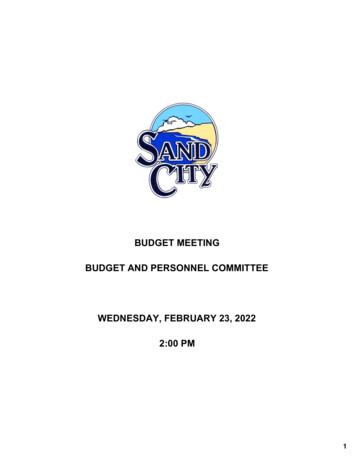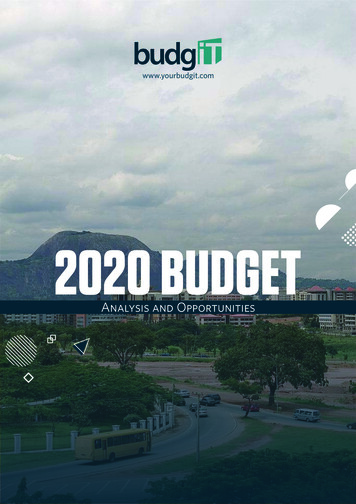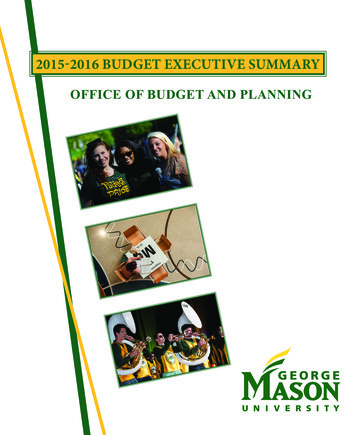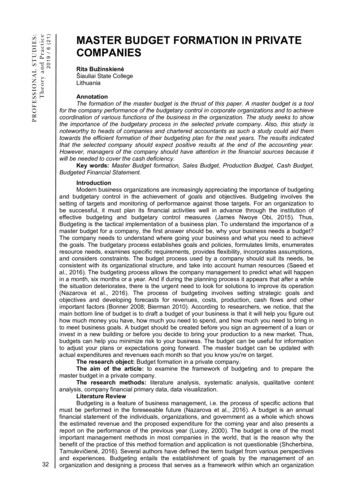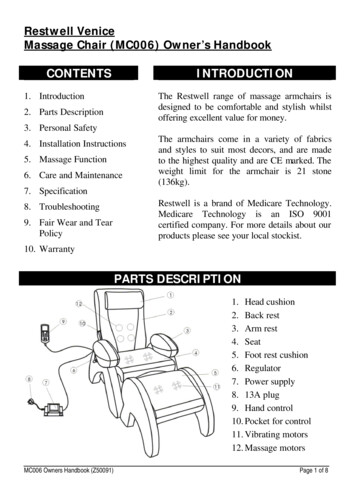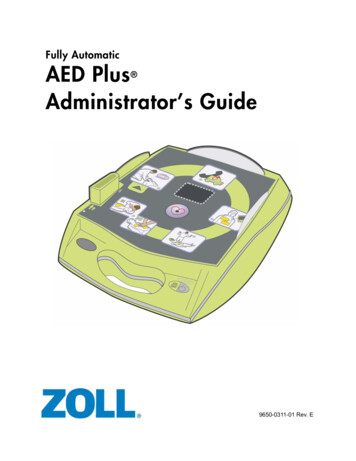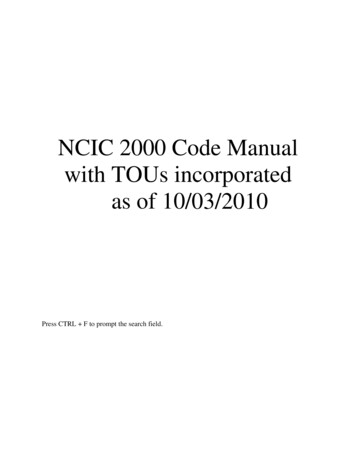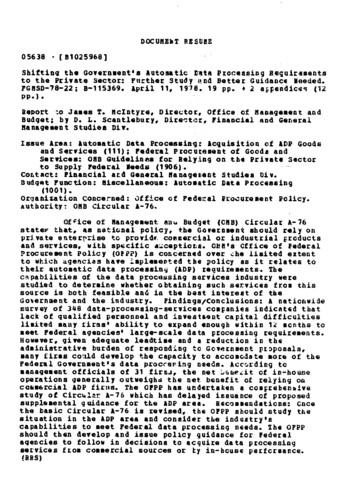
Transcription
DOCUBEhT RESUBE0563881025968]BShifting the Government's Automatic- Dta Proceasing Requirementsto the Private Sector: Further Study l.nd Better Guidance Needed.FGMSD-78-22; B-115369. April 11, 19,78. 19 pp. 2 aspendicEq (12pp.).Report -.o James T. mcIntyre, Director, Office of Management andBudget; by D. L. Scantlebury, Diretorr, Financial and GeneralManagement Studies Div.Issue Area: Automatic Data Processing: Acquisition of ADP Goodsand Services (111); Federal Procurement of Goods andServices: OND Guidelines for Relying on the Private Sectorto Supply Federal Needs (1906).Contact: Financial atd General Nanagelient Studies Uiv.Budget Function: Miscellaneous; Automatic Data Processing41001).Organization Concerned: Office of Federal rocurement Policy.Authority: ORB Circular A-76.Office of Management aia Budget (CBD) Circular A-76stater that, as national policy, the Government should rely onprivate enterprise to providf. comaercial or industrial productsand services, with spcciftc a;ceptioLs. O8's CCffice of FederalProcurement Policy (OPPF) is concerned over ahe limited extentto which agencies have implemented the policy as it relates totheir automatic data processing (ADP) reauirements. Thecapabilities of the data processing services industry werestudied to determine whether obtaining such services from thissource is both feasible and in the best interest of theGo*ernment and the industry.Findings/Conclusions: A nationwidesurvey of 348 data-processing-services companies indicated thatlack of qualified personnel and investsent capital difficultieslimited many firms' ability to expand enough within 12 months tomeet Federal agencies' large-scale data processing requirements.However, given adequate leadtime and a reduction in theadministrative burden of responding to Government pr3posals,many firms coild develop the capacity to accomodate more of theFederal Government's data procrseing needs. According tomanagement officials of 31 firmi, the net .,r¶ae'it of in-houseoperations generally outweighs the net benefit of relying oncosmercial ADP firuls. The OFPP has undertaken a comprehenbavestudy of Circular &-76 which has delayed issuance of proposedsupplemental guidance for the 1DP area. Recommendations: Cncethe basic Circular A-76 is revised, the OFPP should study thesituation in the ADP area and consider the industrysecapabilities to meet Federal data processing needs. The OFPPshould then develop and issue policy guidance for Federalagencies to follow in decisions to acquire data processingservices fLom commercial sources or ty in-house performance.(RHS)
REPORT BY THE US.General Accounting OfficeShifting The Government'sAutomatic Data ProcessingRequirements To The PrivateSector: Further Study AndBetter Guidance NeededA qeneral Accounting Office nationwide survey : the automatic data processing servicesindustry sh lved tiha: many firms were limitedin their near-term aoility to meet significantquantities of Federal ager,:[es' large-scale dataprocessing requirements. Careful consideration of the industry's present and future capabilities by the OIfice of Federal Prc-,urementPolicy within the Cl;[ce of Management andbudget would be useful in revising proposedguidelines to help Federal agencies obtainmore of their automatic data processing fromcommercial sources. This guidance could simultaneously improve the industry's lorgterm capability for meeting .lnore of the Government's automatic data processing ruirements.qPCCo[.! ' FGMSD-78-22APRIL 11, 1978
UNITED STATES GENERAL ACCOUNTING OFFICEWASHINGTON, D.C. 2048DIVISION OF FINANCIAL ANDGENIRIAL MANAGEMENT STUDIoLB-115363The Honorable James T. McIntyreDirector, Office of Managementand BudgetDear Mr. McIntyre:This report discusses },r observations based on (1) asurvey of the automatic data processing services industryand (2) a review of the Office of Federal ProcurementPolicy draft supplement to Office of Menagement and BudgetCircular A-76 proposing additional guidance for the automaticdata processing area. We made this review to assess the reasonableness of the Federal agencies relying on commercialsources for significant quantities of data processing services. We discussed the results of our review with officialsof the Office of Federal Procurement Policy and have incorporated their comments in the report.The scope of this workwas limited to the proposed supplement relating to automaticdata proc:ssing. Another report on the overall effectiveness of executive agencies' policies and programs for acquiring commercial or industrial products and services forGovernment use is forthcoming,Our study was made pursuant to the authority assignedto the Comptroller General in the Budget and Accounting Act,1921 (31 U.S.C. 53), and the Accounting and Auditing Act of1950 (31 U.S.C. 67).We are sending a copy of this r.port to each of theorcanizations that replied to our questionnaire.Sincerely yours,D. L. ScantleburyDirector
GENERAL ACCOUNTING OFFICEREPORT TO THE DIRECTOROFFICE OF MANAGEMENT ANDBUDGETSHIFTING THE GOVERNMENT'SAUTOMATIC DATA PROCESSINGREQUIREMENTS TO THE PRIVATESECTOR:FURTHER STUDY ANDBETTER GUIDANCE NEEDEDD i G E S TBasic policy guidance to Federal agenciesconcerning general reliance on the privatesector for goods and services is set forthin Office of Management and Budget CircularA-76.The Office of Federal Procurement Policy hasbeen trying for some time to issue supplemental guidance to Circular A-76 that wouldcause more of the CGosrnment's automaticdata processing needs to be met by privateindustry instead of in-house. The GeneralAccounting Office has studied the capabilitiesof the automatic data processing services industry to determine whether obtaining suchservices from this source is feasible andin the best interest of both the Governmentanc' the industry.Several factors poiint to the need for thoroughconsideration of the industry before issuinqsuch guidance. For example, from a nationwide questionnaire survey of data processingservices companies in which 348 firms responded,GAO learned that lack of qualified personneland investment capital difficulties limitedmany firms' ability to expand enough within12 months to fulfill Feceral agencies'large-scale data processing requirements.On the other hand, the responses showedthat--given adequate leadtime and a reductionin the administrative burden of responding toGovernment proposals--many firms could developthe caoacity to accommodate more of theFederal Government's data processing needs.GAO interviewed management officials of 21 firmsto learn the extent commercial organizationsrely on outside sources fbr their data processinq needs. According to these officials,the net benefit of in-house iperations generally.TL S1Jrt. Upon removal, the reportcover date should be noted hereon.iFGMSD-78-22
outweighs the net benefit of relying oncommercial service firms. GAO believes thisfactor should be considered in developingguidance consistent with the objectivesand policies of relevant Government programs.While GAO was conducting this review, theOffick, of Federal Procuremeit Policy undertook a comprehensive study of Circular A-76and on November 21, 1977, announced proposedchange-s to the circular in the FederalRegister. This study has delayed issuanceof the proposed supplemental guidance forthe automatic data processing area. The delayprovides an opportunity to assess the impactof changes in the basic circular on methodsfor meeting agency automatic data processingrequirements and determining what additionalguidance might be needed for implementingCircular A-76 in this area.GAO suggests that, once the basii CircularA-76 is revised, the Office of Federal Procurement Policy study the situation in theautomatic data processing area, taking GAC'sfindings into account, and consider theindustry's capabilities to meet Federalautomatic data processing needs. Then, theOffice of Federal Procurement Policy shoulddevelop and issue policy guidance for Federal agencies to follow in decisions to acquire data processing services from commercial sources or by in-house performance.ii
Con tentsPageDIGESTCHAPTER1234INTRODUCTIONPolicy statementAutomatic data processing inGovernment and industryScope of reviewNEED FOR FURTHER GUIDANCE ON APPLICATIONOF CIRCULAR A-76 POLICY TO ADP ACTIVITIESAction to place greater relianceon private industry for ADPrequirementsCommercial organizatiz.'sADPpractices are similar to GovernmentpracticesFew firms could currently assume majorsegments of the Government's ADPneedsPROPOSED GUIDANCE COULD HAVE ADVERSEIMPACTLimited requirements for cost comparisonsLow cost thresholdsUse of functional specifications willrequire evaluation guidanceNeed for procedures to protect theGovernment's investment in hardware,software, and personnel resources111244S71414141516CONCLUSIONS, SUGGESTIONS, AND AGENCYCOMMENTSConclusionsSuggestionsAgency comments17171718Draft of A-76 supplemental guidance pertaining to ADP20Questionnaire--Survey of the ADP serviceindustry26APPENDIXIII
ABBREVIATIONSALvPautomatic data processingGAOGeneral Accounting OfficeOPPPOffice of Federal Procurement PolicyOMBOffice of Management and Budget
CHAPTER 1INTRODUCTIONPOLICY STATEMENTOGfice of Management and Budget (OMB) Circular A-76states that, as national policy, the Government should relyon private enterprise to provide commercial or industrialproducts and services, with specific exceptions. The circular states that Federal agencies will not operate anactivity to provide a product or service that is obtainablefrom a commercial source unless operating that activity hasbeen justified as being in the national interest. Justification will be based on such criteria as necessity formilitary readiness, lack of a suitable commercial source,more costly commercial pertormance, availability fromanother Federal agency, or material disruption or delayCf an agency program by service from commercial sources.OMB's Office of Federal Procurement Policy (OFPP) isconcerned over the limited extent to which agencies haveimplemented the policy as it relates to their automaticdata processing (ADP) requirements. OFPP has been developingadditional guidance for Federal agencies to improve theimplementation of OMB Circular A-76 by moving the Governmenttoward greater use of commercial firms to meet its ADPrequirements.While we were making our review, OFPP undertook acomprehensive study of Circular A-76, and a number of proposed changes are under consideration. These proposed changeswere announced in the Federal Reqister on November 21, 1977,and comments were requested by January 20, 1978. ADP wasidentified in the proposed changes as a management 'unctionfor which separate guidelines could be developed.The mostrecently proposed supplemental guidance specifically addressing the ADP area was issued for comment on August 10,1976, and is presented as appendix I. However, this draftguidance has been temporarily set aside pending completionof the actions on the proposed changes to the basic circular.NUTOMATIC DATA PROCESSING INGOVERNMENT AND INDUSTRYIn the 1950s .-.d early 1960s, no sizable industry wasavailable to fulfill the Government's needs for ADP functions,such as systems anaJy is. systems design, programing, andcomputer operations. Accordingly, agencies had to develop1
their own capabilities in these areas. While they acquiredADP equipment from private industry, agencies generally usedGovernment personnel to operate and manage these facilities,and Government persoI!nci did most systems analysis, systemsdesign, and programing.Through the years, an ADP industry has been developing;today there are many firms that provide services which theGovernment could, an6 to some extent already does, utilize.Services offered by the firms include computer time, timesharing services, management consulting, programing, systems analysis, systems design, facilities management, andtraining. Companies vary in size, number of employees, areasof specialization, and types of services offered, and, therefore, in their near-term capability to meet Governmentneeds.Today, although it makes some use of these firms, theGovernment maintains an inventory of over 11,000 computersand employs thousands to perform ADP-related functions.Estimates of the Government's annual ADP costs run as highas 15 billion.SCOPE OF REVIEWWe made this review to assess the reasonableness ofthe Government's Circular A-76 policy as it relates torelying on private industry for ADP services. Specifically,we:-- Evaluated OFPP's proposed guidance to agencies forcomplying with national policy in meeting ADPrequirements.-- Interviewed management officials in 31 privatesector organizations to learn (1) the extent thatthey relied on the ADP services industry and (2)their plans to satisfy future ADP needs.-- Sent 500 questionnaires to ADP firms located in43 States and the District of Columbia.(Seeapp. II for a copy of the questionnaire withselected responses summarized.)-- Held discussions with officials of 10 Federalagencies about the use of commercial sources fortheir data processing requirements.2
The nationwide questionnaire provided us data from alarge segment of the industry. It covered a wide range ofsubjects, including (1) willingness to provide services toavailable,the Government, (2) kind and extent of services e services to the Government.3
CHAPTER 2NEED FOR FURTHER GUIDANCE ON APPLICATIONOF CIRCULAR A-76 POLICY TO ADP ACTIVITIESThe Office of Federal Procurement Policy plan forapplying Circular A-76 to the Government's ADP needs isto shift attention from in-house operations and servicestoward increased reliance on private industry. Althoughthe ADP services industry is large, the information returnedon our questionnaire led us to conclude that the industrycomprises only a few large firms and many small 3nes. Thesmaller companies constitute a major segment of the industry,and their responses to our questionnaire show several factorswhich inhibit tileir readily offering services to the Gove. nment. Additionally, comments from the industry addressedthe complexity of the ADP services issue and suggested th!atit be given further study ard evaluation Prior to formulatingsupplemental guidance to Circular A-76.In our opinion,OFPP's approach needs to recognize the short-term limitationsof industrial capability, or the advantages OFPP envisionsfor both Government and industry will not be realized.ACTION TO PLACE GREATER RELIANCEON PRIVATE INDUSTRY FO ADPREQUIREMENTSOFPP's objective is to increase Pgencies' reliance uponcommercial ADP sources, whenever possible. To accomplishthis, OFPP has drafted planning and management guidelinescalling for each agency to initiate a positive action program to ensure that the policy and requirements o? CircularA-76 are fully implemented. The guidelines would :.ncludesuch matters as (1) review and revision of agency directivesto incorporate A-76 requirements and (2) preparation ofmultiyear plans to include a schedule of actions with milestones to achieve greater reliance on the private sectorfor ADP services. (See app. I for a copy of the most recentdraft of the guidance made available by OFPP.)Circular A-76's basic policy is to rely on the privateenterprise system to supply the Government's needs except whenit is in the national interest for such needs to be provided in-house. One of the circumstances cited in the circular for the Government's providing such services in-houseis when procurements from commercial sources would result inhigher costs to the Government. Thus, economy is a key factor in choosing between in-house or commercial resources.4
In our opinion, OFPP should consider cost and industrycapability in finalizing and issuing supplementalguidanceto Circular A-76 for two reasons. First, our discussionswith officials of many of the companies we visitedclearlyshowed that they find it more beneficial to havemosttheir ADP services done in-house by their own staffs. ofInthis respect, commercial practice is similar tothat ofmany Federal agencies. Second, the responses toour auestionnaire showed that only a limited number ofADP servicefirms currently have the capability to assume th envisioned for them by OFPP. Thus, an attempt to roleadditional major segments of the Government's ADP movements to commercial firms in a short time may be reauirecounterproductive. These points are discussed in thefollowingsections.Commer:ial organizations' ADP practicesare similarto Governmen practicesTo learn why and to what extent commercial organizationsrely on contracted ADP services, we interviewedmanagementofficials in 31 private sector organizations whichat one time seriously considered or evaluated using,use, orcommercial ADP services. These organizations, locatedinsixeastern and midwestern metropolitan areas, hadannual operating budgets racging from 6 million to well over 1 billion.Most of the organizations operate internal ADPfacilitiesproviding 75 percent or more of their total ADPOfficials from these organizations expressed the requirements.opinion thatthe benefits of in-house operations generally outweighthoseof relying on commercial ADE service firms.Of the 31 firms interviewed, only 2 firms' officialsstated they meet all of their requirements fromsources and only 2 indicated they provided 100 outsidePercent oftheir ADP services in-house.We obtained information about the number of personnelemployed in ArP activities by these 31 firms.Of the twocompanies meeting all their requirements from outsidesources,only one had no XtP personnel on its rolls. Thesizesofthe ADP staffs for the remaining 30 firms wereas follows:5
Number of ADP personnelemployedUnder251 351 601 901 1,001 OverNumber of firms2503006009001,0001,2001,2002013300330In selecting organizations for interviews, we intentionally sought firms that employed large numbers, as well asthose that employed small numbers, of ADP personnel toobtain a wide spectrum in terms of size and magnitude ofADP activity.Many of these firms had established policies relatingto the use of commercial ADP services, and these policiesconsidered factors, such as those shown below.Circumstances under whichcommercial ADP sources are usedNumber of firms (rote a)When in-house staff lacked required expertise14When in-house resources arefully utilized10To acquire developed systems,applications, or programs(e.g., payroll, accountsreceivable, accounts payable,and inventory control)12Other10a/Some of the firms had multiple reasons for usingcommercial ADP sources.Of the 29 firms that did use outside sources, weasked if cost analyses had been made to determine whetherservices should be provided in-house or obtained fromexternal sources. Twelve firms indicated they did makecost analyses; ten had found it more cost advantageousto stay in-house generally; one concluded it was sometimes6
advantageous to use outside sources; and one found noappreciable difference. Even though it was determined tobe generally cost advantageous to perform work in-house,a decision to do the work outside could be made for oneof the reasons cited in the table above. Officials ofseveral organizations interviewed told us they plan tomeet even more of their ADP needs through internal resourcesin the future.Disadvantages in using commercial services cited by theofficials included:-- Management tends io lccsof its operation.control over Part or all-- Contracting requires more administrative effortand resources.-- Services are not always provided on a timely basis.Overall, however, the officials were satisfied with those&DP services they did obtain from external sources.Few firms could currently assumer2jor segments of the Government's ADP needsOFPP officials believe that the ADP industry, althoughrelatively new, now has the capability of providing much ofthe ADP needs of Government and has the flexibility toexpand as needed. Our analysis of the 348 questionnaireresponses also points out that, given sufficient time, adequate capital, and qualified *,ersonnel, the firms couldmeet much of the Government's needs. However, within asingle year, only a limited number of firms could read.lyprovide large quantities of service.Several factors limit the firms' ability to providemore ADP services to the Government in the near future.-- Limited capacity.-- Lack of capital for expansion.-- Lack of qualified contracting personnel.7
Limited capacityOf the 348 firms responding to our questionnaire, 218(63 percent) had 50 or fewer full-time ADP employees.Inour opinion, many Federal agency ADP requirements wouldneed to be segmented or specially structured into smalltasks for this size of firm to be capable of responding toagency procurement efforts. The number of people employedby firms responding to the questionnaire is shown below:Number of employeesNumber of firms1 - 2021 - 5051 - 100Over 100Not disclosedin response116102497011Total348Two skill areas needed to meet Federal agencies' ADPservices requirements are analysts and programers. Thequestionnaire data revealed that many of the firms have onlylimited numbers of full-time employees in these two skillareas, as indicated in the following graphs.8
220200 -FIRMS REPORTINGFULL-TIME .404150511-6061-7714631606001-100 OVER 100FULL-TIMEAWiALYSTS200FIRMS REPORTINGFULL-TIME PROGRAMERS1881601S0140U.0 PROORAMERS9716081-906401-100 OVER 100
Thus, of the 245 firms reportinq the employmentofanalysts, 189, or over 77 percent, employed 10or fewerfull-time analysts. Of the 277 firms reportingment of programers, 188, or nearly 68 percent. the employhad 10or fewer full-time programers. This data seemsrelate with the statement by many of the firms to cora limited quantity of staff-years could be made that onlyavailablefor programina and systems analysis within thenext 12months.We asked the firms to estimate the quantity ofservices they could provide the Government duringthe next12 months. The following table summarizes theirstatedcapability for programing and systems analysisservices.Staff-years availablefor Government workin the next 12 months01 6 21 51 Over52050100100Number of firms bytype of service (note ome firms provide both programing and systemanalysis/design services.As shown above, many firms couldsmall amountsof services, but their capability wouldProvidebeinsufficienttofill the needs of many Government aqencies.Significantly,96 respondents said that they could not Provideany programing or systems analysis during the next year.Lack of capital for expansionA number of the respondents were small- or medium-sizefirms with ADP revenues of less than 5 millionannually,and many stated they would have difficulty expanding.Ninety-nine firms said the lack of capital affectedtheirability to provide more services. Eighty-fiveofthefirmshad revenues of less than 5 million. Typical oftheircomments were:-- The capital markets have all but disappeared,especially for small firms.10
--Capital for small- to medium-size ADP servicefirms is a constant problem.-- Capital for expansion in the ADP service businesswill be difficult to obtain for small firms.Lack of qualified contractingpersonnelMany of the ADP service firms indicated that they hadfew, if any, employees knowledgeable about complex Government contract procedures. Over 25 percent of the firmsresponding said they had never provided Services to theGovernment for this reason.An official of a management consulting firm specializingin computer service industry activities advised us thatGovernment agencies wishing to buy ADP services from a smallor medium-size firm need to change their procurement processes to make the entrepreneur:"* * * feel that (1) he is welcome ind (2) he hasa chance. The Government must recognize thatthese companies have neither the time nor theresources to comply with the myriad difficultiesnormally encountered with submitting * * *proposals and cost justifications required bygovernment * * *."Difficulties in this area had been encountered bysome of the firms queried.Forty-nine firms said they nolonger provide services to the Government because:-- Bidding procedures required too much effort.-- They experienced too many problems with Governmentcontracts (poor specifications, leadtimes, paymentschedules, etc.).--The profit margins were too 'ow.Other concerns voiced by the respondents were:"Excessive work is involved in making a Governmentbid.It often seems a waste of time to respondto solicitations.""Most small ADP companies do not have the timeto spend on learning all that is needed to bid on11
Government work. The time can better be spent ondeveloping commercial accourts.""Because of our size, we have difficulty obtaininglarge Government contracts when competing aqainstindustry giants.""Smaller firms (less than 25 million) cannotspend the time and dollars to submit proposals."Several of the larger firms in the ADP industry alsoexpressed concern about the Government's placing increasedreliance on the commercial sector.Excerpts of their comments follow and point out both that the issue is complexand that the most cost-effective solution would reauirecareful weighing of the alternatives available.One very large respondent indicated the issue:"* * * is not very different from the 'make or buy'decision normally made by private enterprise.The essential point is that EDP [electronic dataprocessing] suppliers offer a wide variety of different methods of achieving the same data processingresult. For example, many solutions may be implemented solely by software, by a software and hardware combination, by a redesign of the hardwareconfiguration through the application of systemsanalysis/design services, by the use of timesharing services, by the sharing of time on anotherFederal agency's computer system, and the listgoes on and on."The Federal Government has long been a leader andinnovator in the use of EDP techniques and has reliedextensively on the private sector for EDP equipmentand services. A great deal of time and effort has beenexpended to develop a higher [sic] competent groupof computer professionals. The investment in peopleand resources has greatly assisted the Government inmanaging its problems and constitutes an importantasset to the Federal establishment."We fully subscribe to Government policy of relianceon the private sector for its goods and servicesand feel in the EDP area there has been substantialcompliance with the policy. There ace areas, however,where greater emphasis could be placed on contractingfor certain types of EDP services. The most important12
factor we believe is the maintenance of a balancebetween thcse activities which can be contractedout and EDP activities which should continue to beperformed in-house, either because of the natureof the EDP service itself or the need for theGovernment to retain direct control of missionessential support functions."A trained and qualified staff capable of understanding the system in sufficient detail towrite and evaluate competitive functional specifications will be required in order for the agencyto compete effectively against outside services,The staff should maintain technical proficiency inorder to keep abreast of the rapid technologicalchanges which characterize the EDP industry so theagency can recommend and approve changes in systemhardware and software."A presumption that either outside contracting orin-house preformance is the least expensive methodto provide an EDP service runs counter to soundmanagement practice. Without cost studies of thevarious alternatives available for satisfying anEDP requirement, an agency could incur unnecessarilyhigh risks and obligations."Another commented that:"Implementation [of the policy] will take strongdirection from OMB. Budget redirection to [contractual services] with [a] resultant reductionof agency manpower on a programmed basis [wouldbe necessary]. Short of that, agencies will maintain and increase in-house personnel."13
CHAPTER 3PROPOSED GUIDANCE COULD HAVE ADVERSE IMPACTSeveral items in the Proposed OFPP guidelines couldadversely affect Government ADP operations, as well asprivate industry. The supplemental guidance would greatlyreduce the requirement for comparative cost studies. Onthe other hand, the low cost thresholds for triggeringcost studies, as now set forth in A-76, could cause bothagencies and industry considerable problems when makingminor changes to existing ADP operations. Finally, thesupplemental directive includes no crit-ria or guidancefor evaluating proposals responding to functional or servicetype specifications; and there is no requirement to analyzewhat impact a shift to private industry would have onGovernment employees, equipment, and software.LIMITED REQUIREMENTS FOR COST COMPARISONSCircular A-76 states that it is the Government'spolicy to rely generally on the private sector for goodsand services, and a cost comparison analysis is notrequired if an agency decides to use contractors. Thisposition is reiterated in the proposed OFPP guidelinesfor agencies in meeting their ADP requirements.In a January 7, 1976, letter to the Administratorif OFPP, we stated that obtaining goods and services atthe lowest possible cost is a sound public policy; weindicated our agreement with the need to keep the expenseand delay involved in making cost studies to a minimum,but we also pointed out that without making cost comparisons, the risk of selecting an uneconomical alternativewill be greatly increased. This point was specificallymade by a number of the firms responding to our questionnaire.(See p. 12 for one such view.)LOW COST THRESHOLDSWhile cost comparisons are key elements in determiningwhether work should be contracted out or performed in-house,such s
the automatic data processing area. The delay provides an opportunity to assess the impact of changes in the basic circular on methods for meeting agency automatic data processing requirements and determining what additional guidance might be needed for implementing Circular A-76 in this area. GAO suggests that, once the basii Circular


